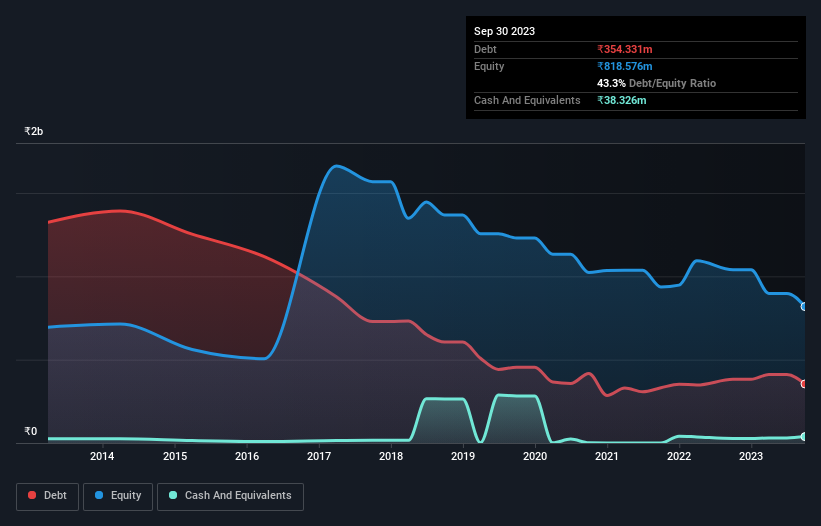Health Check: How Prudently Does Super Spinning Mills (NSE:SUPERSPIN) Use Debt?
Howard Marks put it nicely when he said that, rather than worrying about share price volatility, 'The possibility of permanent loss is the risk I worry about... and every practical investor I know worries about.' So it seems the smart money knows that debt - which is usually involved in bankruptcies - is a very important factor, when you assess how risky a company is. As with many other companies Super Spinning Mills Limited (NSE:SUPERSPIN) makes use of debt. But is this debt a concern to shareholders?
When Is Debt A Problem?
Debt is a tool to help businesses grow, but if a business is incapable of paying off its lenders, then it exists at their mercy. If things get really bad, the lenders can take control of the business. However, a more common (but still painful) scenario is that it has to raise new equity capital at a low price, thus permanently diluting shareholders. Having said that, the most common situation is where a company manages its debt reasonably well - and to its own advantage. When we think about a company's use of debt, we first look at cash and debt together.
Check out our latest analysis for Super Spinning Mills
How Much Debt Does Super Spinning Mills Carry?
You can click the graphic below for the historical numbers, but it shows that Super Spinning Mills had ₹354.3m of debt in September 2023, down from ₹382.2m, one year before. However, it also had ₹38.3m in cash, and so its net debt is ₹316.0m.

How Strong Is Super Spinning Mills' Balance Sheet?
We can see from the most recent balance sheet that Super Spinning Mills had liabilities of ₹321.4m falling due within a year, and liabilities of ₹230.5m due beyond that. Offsetting these obligations, it had cash of ₹38.3m as well as receivables valued at ₹16.0m due within 12 months. So it has liabilities totalling ₹497.5m more than its cash and near-term receivables, combined.
This is a mountain of leverage relative to its market capitalization of ₹505.5m. This suggests shareholders would be heavily diluted if the company needed to shore up its balance sheet in a hurry. There's no doubt that we learn most about debt from the balance sheet. But it is Super Spinning Mills's earnings that will influence how the balance sheet holds up in the future. So when considering debt, it's definitely worth looking at the earnings trend. Click here for an interactive snapshot.
In the last year Super Spinning Mills had a loss before interest and tax, and actually shrunk its revenue by 63%, to ₹381m. To be frank that doesn't bode well.
Caveat Emptor
Not only did Super Spinning Mills's revenue slip over the last twelve months, but it also produced negative earnings before interest and tax (EBIT). To be specific the EBIT loss came in at ₹49m. When we look at that and recall the liabilities on its balance sheet, relative to cash, it seems unwise to us for the company to have any debt. Quite frankly we think the balance sheet is far from match-fit, although it could be improved with time. Another cause for caution is that is bled ₹54m in negative free cash flow over the last twelve months. So in short it's a really risky stock. When analysing debt levels, the balance sheet is the obvious place to start. But ultimately, every company can contain risks that exist outside of the balance sheet. To that end, you should learn about the 4 warning signs we've spotted with Super Spinning Mills (including 2 which can't be ignored) .
If you're interested in investing in businesses that can grow profits without the burden of debt, then check out this free list of growing businesses that have net cash on the balance sheet.
New: Manage All Your Stock Portfolios in One Place
We've created the ultimate portfolio companion for stock investors, and it's free.
• Connect an unlimited number of Portfolios and see your total in one currency
• Be alerted to new Warning Signs or Risks via email or mobile
• Track the Fair Value of your stocks
Have feedback on this article? Concerned about the content? Get in touch with us directly. Alternatively, email editorial-team (at) simplywallst.com.
This article by Simply Wall St is general in nature. We provide commentary based on historical data and analyst forecasts only using an unbiased methodology and our articles are not intended to be financial advice. It does not constitute a recommendation to buy or sell any stock, and does not take account of your objectives, or your financial situation. We aim to bring you long-term focused analysis driven by fundamental data. Note that our analysis may not factor in the latest price-sensitive company announcements or qualitative material. Simply Wall St has no position in any stocks mentioned.
About NSEI:SUPERSPIN
Adequate balance sheet with low risk.
Market Insights
Community Narratives




